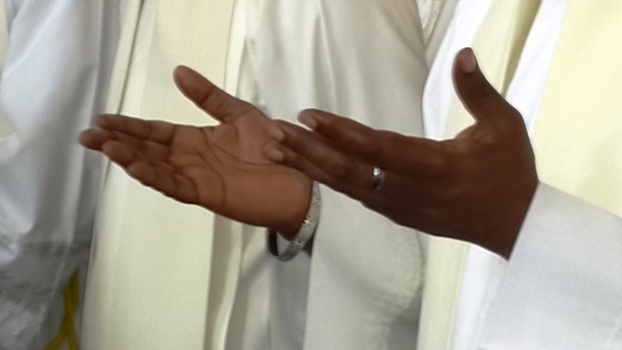Jesus In Controversy With The Pharisees

(By Fr. Dexter Brereton)
Jesus locked in another battle with the Pharisees over rituals.
The Gospel reading this Sunday comes from a controversy between Jesus and the Pharisees regarding ritual purity. It begins with a challenge from the Pharisees and scribes regarding the failure of some of Jesus’ disciples to perform the ritual washings before eating prescribed for the Jews. This leads Jesus to counter with the point that the Scribes and Pharisees were given to substituting their own human traditions for the commandments of God, creating a space for people to neglect their moral obligations towards others.
[simpleazon-image align=”left” asin=”1612783864″ locale=”us” height=”375″ src=”http://ecx.images-amazon.com/images/I/51ENWCITPFL.jpg” width=”242″]Since they play a major role in this story, it is important, as background, to say a little bit about the Pharisees. These were not members of the clergy but laymen – whose zeal for the law of Moses was extremely important in the preservation of Jewish faith and identity. Though the word ‘Pharisee’ in the English language has come to designate a kind of ‘religious hypocrite’ it is also important to point out that they shared with Jesus a number of common beliefs, e.g. a belief in the resurrection of the dead. The gospels also make it clear that the Pharisees were much less implicated in the death of Jesus than were members of the priestly class. Notwithstanding these facts, it is fair to say that they considered Judaism as a religion centered on the observance of the law, and as often happens with religious people, their interpretation of the law turned out to be quite severe indeed.
In a related story, a number of years ago, John Allen of the National Catholic Reporter coined the term “Taliban Catholicism.” By this he meant a “distorted angry form of the faith that knows only how to excoriate, condemn and smash the TV sets of the modern world.” It is a humour-less expression of religion. In fact, ‘Taliban Catholicism’ represents a tendency found in all religious faiths.
In Catholicism, this religious rigidity often insists on the visible, external marks as evidence for one’s Catholicism while ignoring the internal realities of faith: Love, conversion, forgiveness, compassion. What rises is a ‘religion of the externals.’ This is not true religion. Quite often, using the words of the Gospel, they “put aside the commandment of God to cling to human traditions.”
Religion, in its purest sense it the externalization of faith. Faith is the generous human response to God’s saving love. It is not something that can be locked up in prison or strictly regulated by our petty human laws. Faith gives to all of life a new direction, a whole new horizon. We see life much differently than we did before that is why our Evangelical brothers and sisters are right when they say that they are “reborn.” More particularly, the experience of faith radically affects the way we see human beings. PEOPLE come before THINGS. Here is a story which illustrates this point:
One day as a man was washing down his brand new car, his four year old son took up a stone and scratched graffiti on the car. Incensed, the man roughly grabbed the boy by his hands and slapped it hard several times, without even noticing that he was hitting the boy with a wrench which was still in his hands. At the hospital, the little boy lost all his fingers because of the multiple fractures which he suffered as a result of the beating. On seeing his father absolutely distraught because of his injuries, the boy in his innocence turned to his father and asked: “Daddy, when are my fingers going to grow back?” The man was deeply shaken by the question and remained dumbstruck. Annoyed and sickened by his own actions, he went back to the car and sat down in front it. Alas, it was only then that he saw what his young son had scribbled in the brand new paintwork “I LOVE DADDY.” Anger and Love have no limits. Always choose the latter to have a beautiful life. Things are created to be used and people are created to be loved. But the problem in today’s world is that we use people and we love things.






